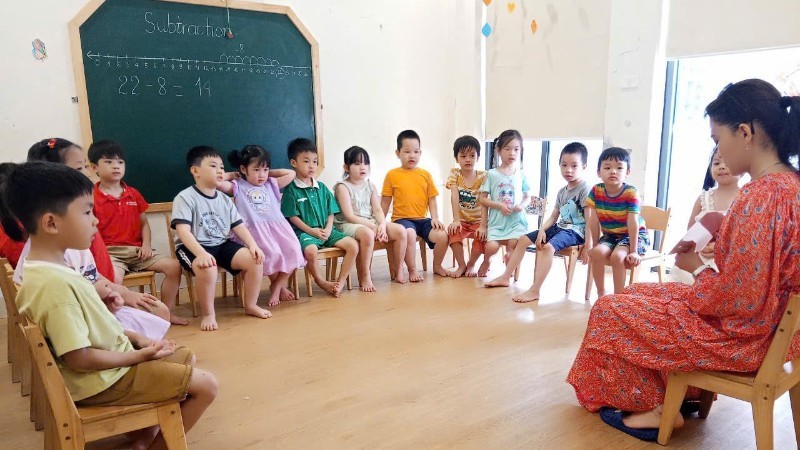
Not only do these policies expand learning opportunities for hundreds of thousands of children, especially in disadvantaged areas, they also deeply demonstrate the concern of our Party and State in placing people, especially future generations, at the center of development.
Opportunity to leave no one behind
Upon hearing the news that the National Assembly passed the Resolution on universalizing preschooleducation for children aged 3-5, Ms. Tong Thi Khuyen - Principal of a preschool in the border area of Dien Bien province expressed her joy and excitement. During many years working in the highlands, she has repeatedly mobilized each bag of rice and each warm coat to support students, just hoping that they have enough food and clothing to go to school regularly. For educators in remote areas, universalizing preschool education is not only a great policy, but also an aspiration that has been realized for many years.
Minister of Education and Training Nguyen Kim Son shared: The issuance of the Resolution on universalizing preschool education for children aged 3-5 is an urgent requirement, both to implement the Central Government's policy and to meet practical requirements. Although Vietnam has universalized preschool education for 5-year-old children since 2010, there are still nearly 300,000 children aged 3-4 who have not participated in school (mostly in remote areas, difficult conditions), leading to inequality in access to education.
Last June, the National Assembly officially passed two strategic resolutions: One is the Resolution on universalizing preschool education for children aged 3-5, aiming to achieve national universalization standards by 2030, focusing on disadvantaged children, disadvantaged areas, and industrial zones. The other is the Resolution on tuition exemption and support in the entire national education system, in which children studying in public preschools are exempted from tuition fees, children studying in non-public schools can be supported depending on the decision of the Provincial People's Council.
Professor, Dr. Le Anh Vinh, Director of the Vietnam Institute of Educational Sciences, commented: “This is a strategic step to build educational equity right from the start.” This viewpoint has received consensus from many experts and international organizations such as UNICEF and the World Bank - units that always emphasize the role of preschool education in human development and social equality.
Efforts to care for the younger generation
One of the biggest bottlenecks in education today is the teaching staff. Although the Government has issued a policy to supplement the payroll, as of May 2025, the country is still short of nearly 120,000 teachers at all levels, of which preschools alone are short of about 45,000 people. Recruitment efforts are still facing many difficulties: In the past three years, out of a total of 66,000 newly assigned payroll quotas, localities have only recruited less than 6,000 teachers. It is forecasted that by 2030, to meet the requirements of universalization, nearly 48,000 more preschool teachers will need to be recruited, of which about 21,400 will need to be added in the 2026-2030 period.
The quality of child care and education is under considerable pressure. Almost all preschool children attend two sessions a day and have lunch at the boarding school. However, in many places, especially in remote schools, the conditions for children to develop comprehensively are still lacking: lack of playgrounds, functional rooms, learning materials, and teachers even have to take on multiple roles from care to cooking and cleaning. Overcrowding and lack of equal investment are affecting the quality of preschool education.
For disadvantaged children, the challenge is even greater. Children of industrial workers mostly attend small private classes, which are expensive and have limited facilities. Many children with disabilities still do not have access to integrated preschools. This gap cannot be overcome by individual efforts of each facility, but requires strong support mechanisms from policy.
In that context, policies such as tuition exemption, lunch support, teacher subsidies, etc. are not only important resources, but also an affirmation of the State's responsibility and commitment to educational equity. However, for these policies to be practically effective, a synchronous and effective organizational system and a clear implementation roadmap are needed, so that each new policy can truly reach every classroom and every child, even in the most remote places.
Systemic policy turning point
From local practice, many mountainous provinces have noted that the two resolutions recently passed by the National Assembly are not only an immediate boost, but also a systematic policy turning point. This is the first time that preschool education has been placed in a strong enough legal and financial framework to move towards comprehensive universalization.
Deputy Director of the Department of Education and Training of Lang Son province, Ho Cong Liem, said: "The policy of universalizing and supporting tuition fees not only creates motivation, but also provides a legal and financial basis for localities to accelerate investment in schools and stabilize the workforce."
In Dien Bien province, Ms. Tran Thi To Uyen, Head of the Preschool-Primary Education Department (Department of Education and Training of Dien Bien province) also affirmed: "The resolution is like an important push, helping the province boldly propose specific targets and solutions to universalize education for 3-4 year old children, and strengthen the teaching staff in particularly difficult areas."
The Resolution on universalizing preschool education for children aged 3-5 sets the goal of implementing national universalization for children aged 3-5 by 2030, with priority given to children in ethnic minority areas, mountainous areas, areas with particularly difficult socio-economic conditions, industrial zones and disadvantaged groups.
To realize this goal, the Resolution proposes a system of synchronous solutions from expanding the school network, increasing recruitment and improving the standards of the teaching staff to policies to support lunch, tuition and school supplies for children. Notably, the Resolution empowers localities to flexibly develop appropriate plans and roadmaps, while encouraging socialization.
Along with that, the Resolution on tuition exemption and support in the entire national education system, including preschool education, creates a clear legal basis for expanding access to early education, especially in the context of the increasing number of children studying at non-public institutions in urban areas and industrial parks.
According to regulations, children studying at public preschools are exempt from tuition fees. For children studying at non-public facilities, the Provincial People's Council can decide to support tuition fees, depending on the conditions and budget balance capacity of the locality. The Central Budget will consider supporting a part of the budget for localities that are not able to balance themselves, according to the allocation principle in accordance with current regulations.
It is notable that both resolutions were with a comprehensive and flexible approach, ensuring both the principle of fairness developed and practicality. The policies not only target children – the direct beneficiaries, but also gradually remove difficulties in recruiting teachers, upgrading facilities, and reducing the financial burden on families. With a specific roadmap, clear priority targets, and transparent financial mechanisms, these policies will create favorable conditions for localities to proactively implement from the groundswell level.
Source: https://baolaocai.vn/buoc-tien-chien-luoc-trong-chinh-sach-an-sinh-Giao-duc-post648001.html












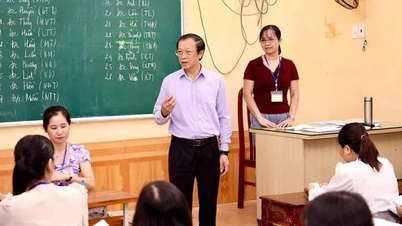




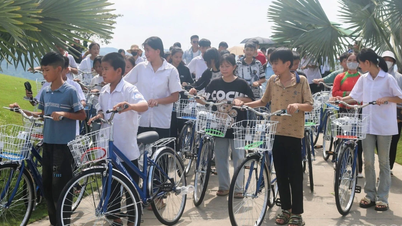
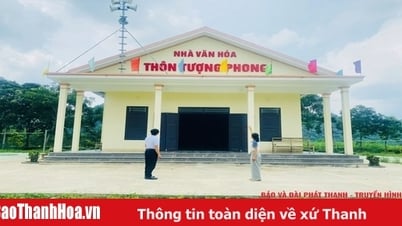

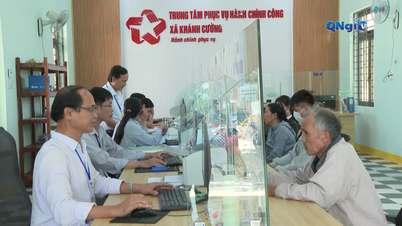

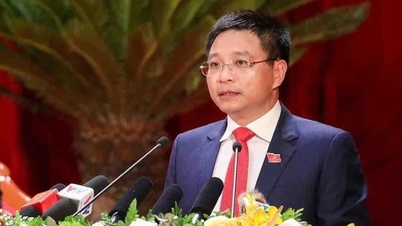



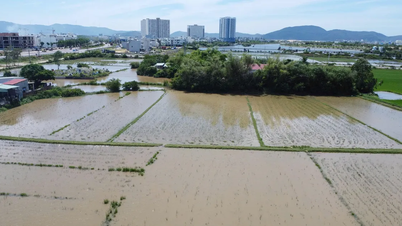





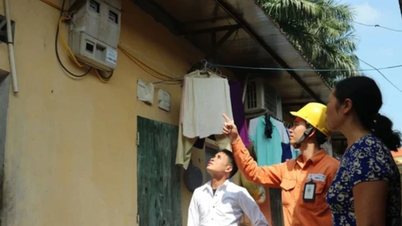

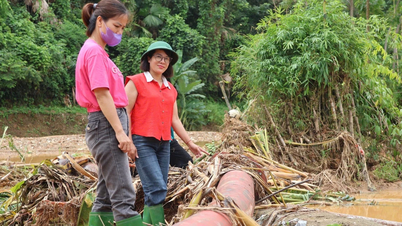

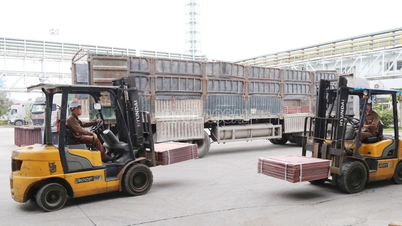

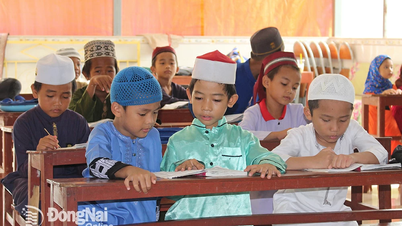













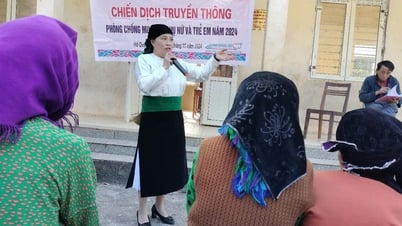



















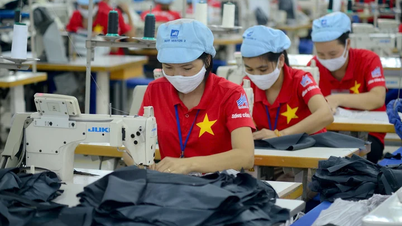





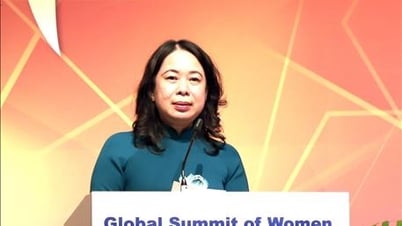






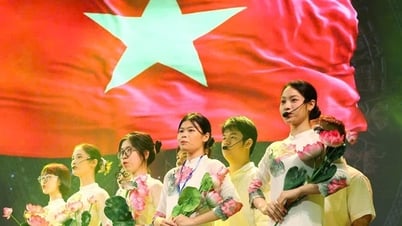







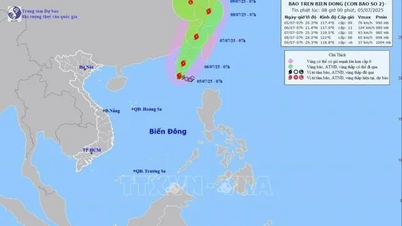


![[OCOP REVIEW] Bay Quyen sticky rice cake: A hometown specialty that has reached new heights thanks to its brand reputation](https://vphoto.vietnam.vn/thumb/402x226/vietnam/resource/IMAGE/2025/7/3/1a7e35c028bf46199ee1ec6b3ba0069e)










Comment (0)